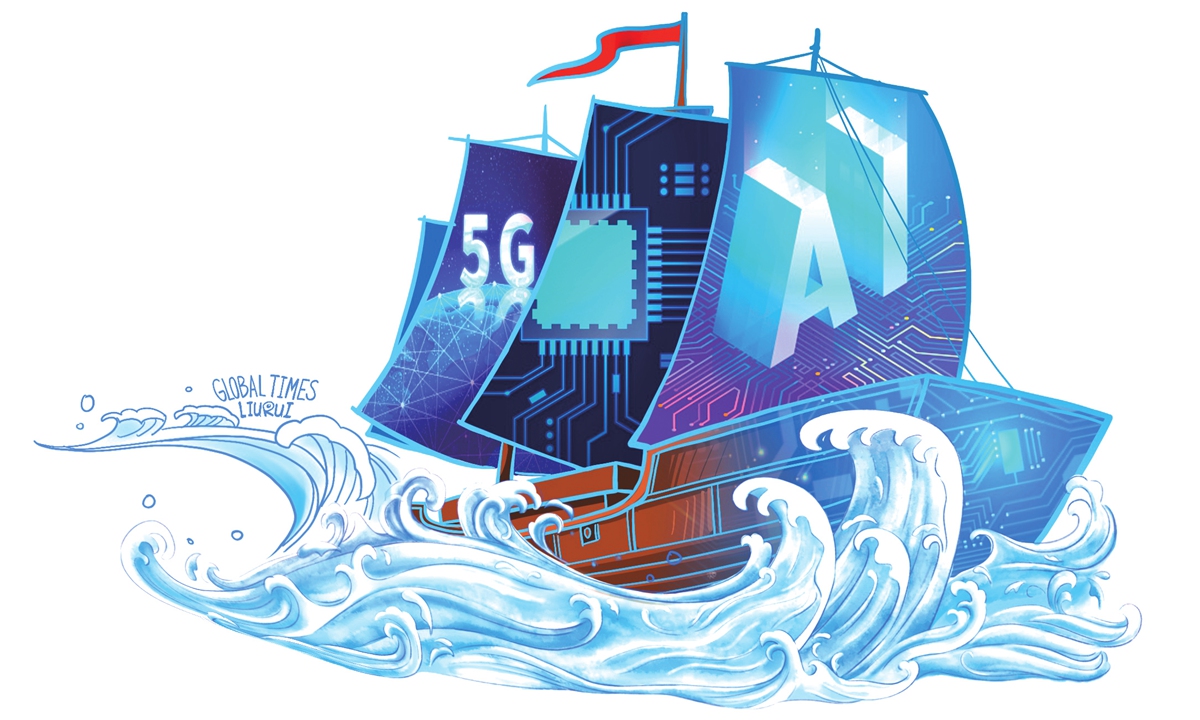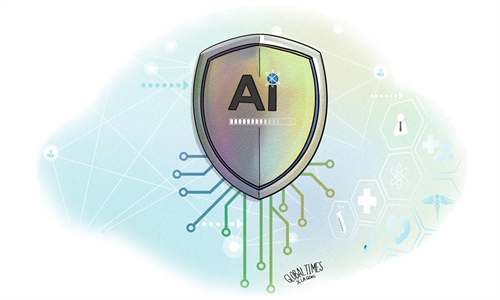China should unleash the spirit of struggle in the 'Third Wave' to lead the 'Fourth Wave'

Illustration: Liu Rui/GT
Forty years ago, China's Sanlian Bookstore published The Third Wave by renowned American futurist Alvin Toffler. Five years later, Toffler came to Beijing. At that time, the "Third Wave," guided by the information technology revolution, was sweeping across China.In 2006, Toffler was named as one of "the top 50 foreigners who have had the greatest influence on China in recent centuries" by the People's Daily. The passage introducing Toffler stated, "Toffler did not bring direct wealth to China, but he provided people with a dream and a method to achieve it."
Today, as we still experience the lasting impact of the "Third Wave," the "Fourth Wave," represented by AI technology, is rapidly approaching, testing our ambition to ride the crest of the wave.
Toffler divided human society into three phases: a "First Wave" agricultural phase, starting about 10,000 years ago; a "Second Wave" industrial phase, starting from the late 17th century; and a "Third Wave" phase starting from the late 1950s.
When Toffler was in Beijing, I had the opportunity to interview him. In our conversation 35 years ago, Toffler mentioned to me that information is the raw material, and a production method based on information as raw material has emerged.
Toffler's classic quote is: Informatization will alter the way humans live and work. His predictions have long since become a reality. Now, the economic resources we discuss will inevitably include information resources and related infrastructure. However, for the Chinese people who had just opened the window to the world at that time, especially the younger generation, the "Third Wave" brought not only an understanding of "information" but also an open wave of "creating our future by ourselves."
Reviewing the interview notes from back then, a statement from Toffler still holds strong relevance today. He told me, "When I came to China, I told my friends here that I thought China's future did not solely depend on what was happening internally but also on what was happening externally. Therefore, more information and faster information circulation are needed. The key to China's progress may depend on its role in this new revolution in the whole world."
The popularity of the "Third Wave" in China was a result of the needs of the times as well as the reform and opening-up of the country.
Once China entered this wave, it would not withdraw and must continue to move forward. This is not a question of whether we have the ability or willingness to continue, but that we cannot stop.
Why could China transform from a poor and backward country into the world's second-largest economy? It is precisely through the pursuit of the "Third Wave" that the driving force of China's modernization is demonstrated. This is China, a great nation that has embarked on the path of reform and opening-up, driven by its innate nature as a unique Eastern civilization.
In 2016, Toffler passed away. The "Third Wave" also began to transition into the "Fourth Wave," which is the Fourth Industrial Revolution led by AI technology.
No one has been able to make an accurate estimation of the future of this revolution, but it is destined to be a part of the global major changes and an important force that influences these changes and triggers shifts in the global power structure.
As the US shifts its strategy toward comprehensive containment of China and sees China as its primary competitor, the real test is whether China will be suppressed to only become a "follower," or keep up with the US and become a leader in the Fourth Industrial Revolution.
Of course, Washington has not fully understood why China was able to ride the "Third Wave," and it believes that its own power can suppress China's advancement to the forefront of the Fourth Industrial Revolution.
For China, the important thing is how we can fully unleash the spirit of struggle and combativeness that emerged in the "Third Wave" and release more power to ride the crest of the wave.
The true test of the "Third Wave" for China is whether we can achieve super-speed catch-up, which is China's sprinting power. In the "Fourth Wave," the real test is more about our endurance and tenacity.
When we are undergoing major changes unseen in a century, we need to remember Toffler's judgment about the future: "The future is fluid, not frozen. It is constructed by our shifting and changing daily decisions, and each event influences all others."
The author is a senior editor with People's Daily, and currently a senior fellow with the Chongyang Institute for Financial Studies at Renmin University of China. dinggang@globaltimes.com.cn. Follow him on Twitter @dinggangchina



